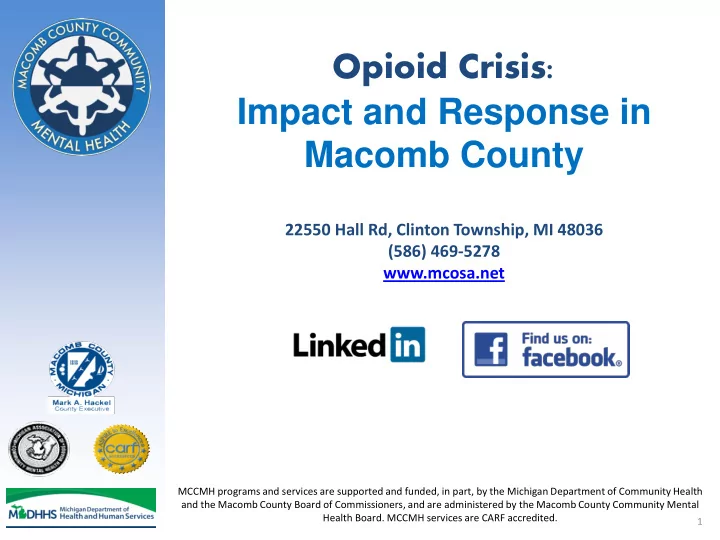

Opioid Crisis: Impact and Response in Macomb County 22550 Hall Rd, Clinton Township, MI 48036 (586) 469-5278 www.mcosa.net MCCMH programs and services are supported and funded, in part, by the Michigan Department of Community Health and the Macomb County Board of Commissioners, and are administered by the Macomb County Community Mental Health Board. MCCMH services are CARF accredited. 1
* Total “heroin related deaths” are deaths due to either heroin alone or heroin in combination with other drugs or alcohol. ** The “other” category are deaths due to illicit drugs (excluding heroin), prescription drugs in combination with other drugs or alcohol (excluding heroin), and other ingested, injected or inhaled substances. *** From 2011-2013 Fentanyl Deaths were included in Prescription Medication Deaths. **** Total deaths is the summation of total heroin-related, prescription medication, other, and fentanyl deaths (excluding heroin). Macomb County Health Department, Office of Health Planning 2
Macomb Burden Document 2016 • Opiate/opioid-related hospitalizations increased from 2008 to 2013 and 14.5% of Michigan’s total heroin hospitalizations occur in Macomb County • Prescription drugs and heroin cause the most deaths by a single substance, while the combination of these substances cause the most deaths by multiple substances • Compared to other counties in Michigan, Macomb County had among the highest reported fatal heroin overdoses from 2010 to 2012 • The number of deaths by heroin significantly increased from 2005 to 2013 • Geographically, northern Macomb County has a much lower rate of opiate/opioid-related deaths than southern Macomb County • Most opiate/opioid-related drug deaths occur between the ages 20 to 29 and 35 to 54
Figure 5.4
Primary Substance at Admission 70 60 50 Alcohol 40 Opioids Percent Marijuana 30 Cocaine-Crack 20 10 0 5
Brain Disease Video https://www.youtube.com/watch?v=1G93lz-JK-E 6
The chronic nature of substance use disorders means that relapsing to alcohol or drug use at some point is not only possible, but likely. Relapse rates (i.e., how often symptoms recur) for people with substance use disorders are similar to relapse rates for other well-understood chronic medical illnesses such as diabetes, hypertension, and asthma, which also have both physiological and behavioral components. Treatment of chronic diseases involves changing deeply imbedded behaviors. Lapsing back to drug use indicates that treatment needs to be reinstated, adjusted, or that another treatment should be tried. McLellan AT, Lewis DC, O’Brien CP, Kleber HD. Drug dependence, a chronic medical illness: implications for treatment, insuran ce, and outcomes evaluation. JAMA 284(13):1689-1695, 2000. 7
Continuum of Care in Macomb County • Prevention • Early Intervention • Treatment • Recovery 8
Treatment Outpatient Intensive Outpatient Medication Assisted Treatment Case Management Residential Withdrawal Management Co-occurring Disorders Outreach Services 9
Recovery Services Peer Recovery Coaches Recovery Home Services Recovery Events 10
Accessing Services • Macomb County Community Mental Health Access Center • 586-948-0222 Medicaid Healthy Michigan Plan MI Health Link Uninsured/limited means to pay for services 11
12
Prevention Coalitions Bay Haven Prevention Coalition Chippewa Valley Coalition for Youth and Families Clintondale: Make a Difference Community Coalition Eastpointe Community Action Coalition Fraser Community Action Coalition L’Anse Creuse Community Action Coalition Mount Clemens Coalition for Youth and Families Northwest Zero Tolerance Coalition Roseville Community Coalition Shores Network for Action and Prevention Utica Area Community Action Team Warren Center Line Prevention Coalition
Prevention Take Back Event • DEA, local coalitions, and local Police Departments collaboration • 14,963 pounds of medications collected in Macomb County since 2011
Permanent Disposal Sites for Prescription Drugs Center Line Police Dept. 7070 E. Ten Mile Rd., Center Line, MI 48015 (586) 757-2200 Chesterfield Township Police Dept.* 46525 Continental Drive, New Baltimore 48047 (586) 949-2322 *Drop box in Day Lobby, Mon, Wed., Fri. — 8 a.m. to 4:30 p.m.; Tues. & Thurs. — 1:30 p.m. to 4:30 p.m. Clinton Township Police Dept. 37985 Groesbeck Hwy, Clinton Twp., MI 48036 (586) 493-7800 Eastpointe Police Dept. 16083 Nine Mile, Eastpointe, MI 48021 (586) 445-5100 Fraser Police Dept. 33000 Garfield Road, Fraser, MI 48026 (586) 293-1425 Macomb County Health Dept.** 43525 Elizabeth Road, Mount Clemens, MI 48043 (586) 469-5235 25401 Harper Avenue, St. Clair Shores, MI 48081 (586) 466-6800 27690 Van Dyke, Suite B, Warren, MI, 48093 (586) 465-8090 **All Health Departments DO NOT accept Narcotics Macomb County Sheriff’s Dept . 43565 Elizabeth Road, Mt. Clemens, MI 48043 (586) 469-5151 New Baltimore Police Dept. 37885 Green St., New Baltimore, MI 48047 (586) 725-2181 Richmond Police Dept. 36725 Division Road, Richmond, MI 48062 (586) 727-4000 Roseville Police Dept. 29753 Gratiot Avenue, Roseville, MI 48066 (586) 775-2100 Shelby Township Police Dept. 52530 Van Dyke, Shelby Township, MI 48316 (586) 731-2121 Sterling Heights Police Dept. 40333 Dodge Park Road, Sterling Hts., MI 48313 (586) 446-2800 St. Clair Shores Police Dept. 27665 Jefferson, St. Clair Shores, MI 48081 (586) 445-5300 Warren Police Dept. 29900 Civic Center Drive, Warren, MI 48093 (586) 574-4700 Check with your local pharmacy - some are licensed to take back old medications
562 MACOMB RESIDENTS SERVED SINCE FEBRUARY 16
17
State Grants Prescription Drug and Opioid Overdose Prevention: Narcan Overdose Prevention Education (NOPE) Opioid Overdose Recovery Programs - (peer recovery coach services in emergency rooms) Innovative Strategies for Enhancing Treatment Services to Pregnant Women - Hopeful Hearts Program Drug Court Peer Recovery Support Program 18
Federal Grants Strengthening Families - Iowa Model Narcan Distribution- NOPE Pro Motivational Interviewing in Medication Assisted Treatment Project ASSERT - Peer based hospital services Enhancement and Implementation of Medication Assisted Treatment MISSION Michigan Reentry Program (MI- REP) 19
20
• Opioid Overdose Recovery Programs • Project ASSERT • Drug Court Peer Recovery Support Program • Maintaining Independence and Sobriety through Systems Integration, Outreach, and Networking - Michigan Reentry Program (MI- REP) 21
22
Recovery is everywhere! *23.5 million strong! 10% of USA Adults Currently in Recovery *2012 Partnership for Drug Free Kids and New York State Office of Alcoholism and Substance Abuse Services study. Pictures courtesy of Michigan Celebrate Recovery Walk and Rally. 23
Recommend
More recommend